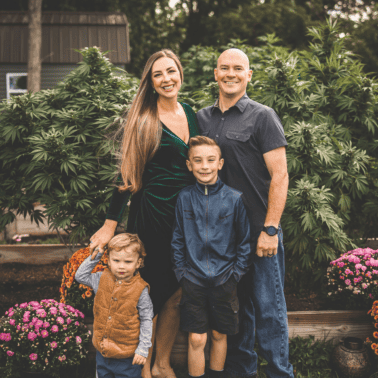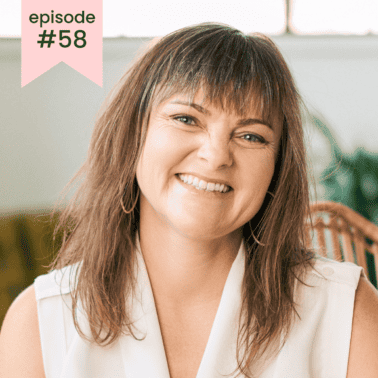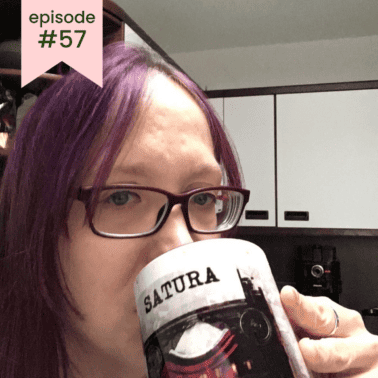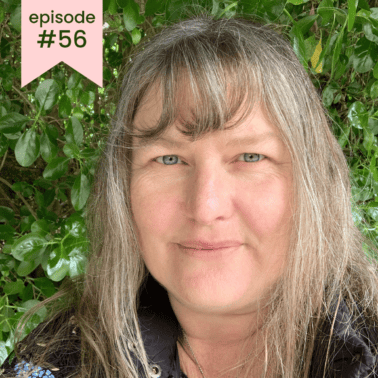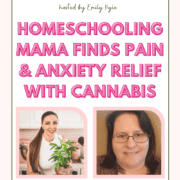Join us as we sit down with Dawn, a homeschooling mother of five who shares her journey towards finding relief from chronic pain and anxiety. After struggling with depression, anxiety, and insomnia for decades, Dawn discovered medical marijuana and obtained her medical marijuana card. Listen in as she recounts how cannabis transformed her quality of life and brought much-needed relief.
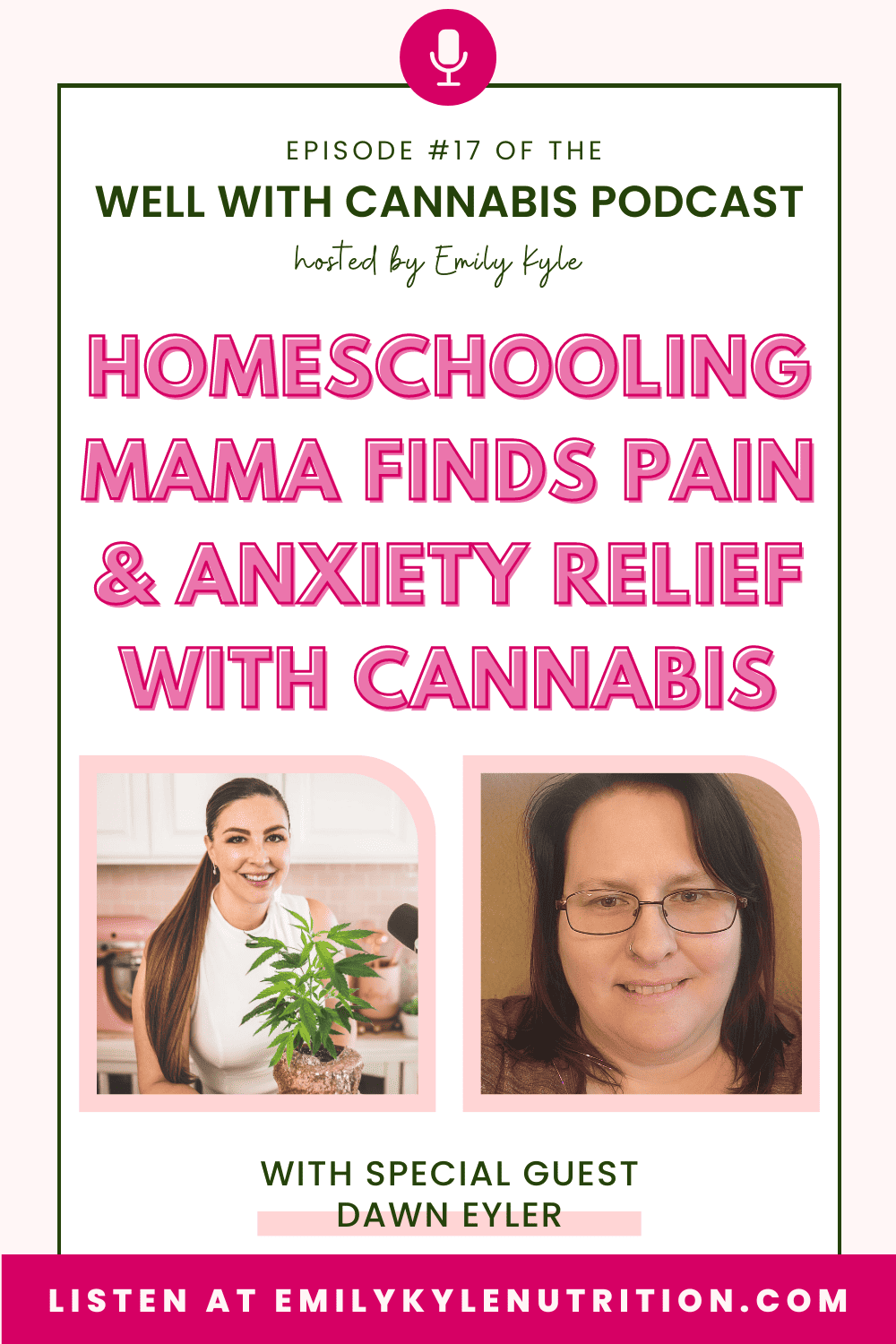
Table of Contents
Features
- Release Date: Wednesday, May 24th, 2023
- Episode Number: Season 1, Episode 17
- Special Guest: Dawn Eyler
Listen To The Episode
Click the play button above to listen to the episode.
Listen to all podcast episodes →
Why You Will Love This Episode
Today we have a very special guest, Dawn Eyler. Dawn is a 51-year-old mom of five who has been happily married for 29 years.
For decades, Dawn struggled with depression, anxiety, and insomnia. Despite trying traditional medications, she found limited relief.
It wasn’t until medical marijuana became legal in her state that she considered it as an alternative solution.
Now, suffering from arthritis in her back and hands along with neuropathy caused by diabetes, she finally decided to get her medical marijuana card. The results have been nothing short of transformative!
Dawn is now able to sleep through the night and has experienced a significant reduction in pain. It has improved her quality of life dramatically.
Join us as we dive deeper into her story and journey toward finding relief.
Full Transcript
Dawn: Don’t let anything hold you back from looking into cannabis, you know? Even if you walk through that door and it ends up not being for you, that’s okay. You can walk back out, that’s no big deal, but just think if you walk through that door and shake off all the stigma and everything, and there’s a really good chance that your life is going to get better, and that is so worth it, so don’t be afraid to walk through that door.
Announcer: Welcome to the Well With Cannabis Podcast, a show dedicated to telling the life-changing stories of those who live well with cannabis all while teaching you how to do the same. Meet your host, Emily Kyle, a registered dietitian nutritionist turned certified holistic cannabis practitioner. Emily changed her life for the better with the help of the cannabis plant, and now she’s committed to helping others do the same.
Tune in each week to hear heartwarming stories and gain the knowledge you need to feel connected, inspired, and supported on your own cannabis journey. Whether you’re a new cannabis consumer or a lifetime lover, you’ll benefit from these uplifting tales of real-life journeys that will show you how you, too, can live your best life well with cannabis.
Disclaimer: Hi there. Before we jump into today’s episode, I wanted to share a note on potentially sensitive content. The episodes on the Well With Cannabis Podcast are created for adult audiences only. We will, at times, cover sensitive topics, including but not limited to suicide, abuse, mental illness, sex, drugs, alcohol, psychedelics, and the obvious use of plant medicine. Explicit language may be used occasionally. Please refrain from watching or listening to the show if you’re likely to be offended or adversely impacted by any of these topics.
The information on this show is for informational and educational purposes only. It does not constitute medical advice. If any of the content on this podcast has brought up anything for you, please reach out or speak to a professional or someone you trust.
Dawn: Well, thank you for the invite. This is going to be a lot of fun.
Emily: I’m super excited, and it sounds like you have kind of a story that I think a lot of women will be able to relate to, so I’d love to dive down deep within and what brought you to cannabis and how did you get here today?
Dawn: Well, it’s kind of a long story, a funny story, actually. I’m kind of a newbie. So here in my state, medical marijuana is legal, but you have to get, you know, your medical marijuana card, and I actually just got that at the end of December.
Dawn: Congratulations! How exciting!
Dawn: Thank you. You know, it really was, and it’s so funny because, as a younger person, I always thought that cannabis was the gateway drug. It was, you know: “you’re going to be a stoner, and you’re never going to be able to have a job” and all of those stereotypes that are out there.
I kind of believed it, but as I’ve gotten older, I’ve started doing my own research into it. I’ve struggled for so many years with anxiety and depression, and insomnia. About 10 years ago, I was diagnosed with diabetes, and so then I started developing neuropathy, pain, and things like that. I talked to my husband about it, and I’m like, these are conditions that cannabis can really help and I really just need some relief. I also have arthritis, so it’s a whole laundry list of things, so I went through the whole process and got my medical card, and it’s been night and day.
Emily: Good.
Dawn: It’s been amazing. I’m sleeping, which is just huge!
Emily: Oh my gosh, there’s nothing better than sleep!
Dawn: It affects everything when you’re not sleeping. It affects everything in your day-to-day life. I mean, it affects my cognitive function, my moods, and my pain levels. It just affects me so much. Just that one thing, just being able to get a good night’s sleep, has been huge, but it has also helped with the pain, neuropathy, my anxiety. It’s just, it’s made a huge impact on my life, so much so that my husband just got his card.
Emily: Yay! That’s cool!
Dawn: Yeah, I know. He saw the wonderful effects that I was having, and he said, “I want that!”
Emily: That is amazing! Oh my gosh!
Dawn: Yeah, so it’s been kind of a long journey to get here. My only regret is that I wish I had done it a couple of years sooner.
Emily: Yeah. So tell me what, so were you doing research on the side? Like, what brought you to cannabis? What sparked your interest to finally decide to give it a try?
Dawn: Well, you’re hearing much, much more about it in the news and on social media, you know? The last few years, it’s just become kind of one of those hot topics that everybody’s talking about, so I thought to myself, is there really something to this? I’ve never smoked pot before in my life.
Emily: Wow! Never ever, ever?
Dawn: Never ever, ever, I know. I’m 51 years old and never, ever, ever. Because, like I said, I always thought that, you know, it was a bad thing. It was a drug; it was an illegal drug. I just started looking online and googling and reading articles and watching videos and talking to people in my real life that uses cannabis and gets their experiences. I was like, you know, I think this can really help me. I think it’s worth a shot to go through the process, you know, and see if it can really make a difference. And it really has. It really has.
Emily: Did you go and get your medical card before ever trying cannabis before?
Dawn: Well, I will be honest. I did have a girlfriend that kind of, you know, gave me a little bit to try. And I did see, like, just from like one or two times, I was like, wow, this is like a huge difference. I’m like, all right, I’m going for it. I’m definitely going for it.
Emily: So if somebody’s listening and they want to try cannabis, and they’re like you, have never tried it before and are not sure where to go, how was your experience getting your medical card? Was it scary, or was it enjoyable?
Dawn: I guess neither of those things, really. It was just kind of like jumping through hoops here in West Virginia where I live, they have some companies that help you through that process. They charge you a fee, of course. Then they have doctors that have gone through all of the courses that West Virginia requires to be able to sign off on people that need medical marijuana.
I opted to go through one of those businesses just because it was just; they made the whole process easier. It was a pretty simple process. I gave all of my information, you know, met with the doctor, and then he just emailed me my little certification letter, and then I just gathered up all my paperwork and sent it off to West Virginia and paid their fee because everybody’s got to get their fee. Then I waited about a month, and it came back. It was a fairly simple process. There were no hangups or snags or anything. The company that I used was really helpful in just kind of guiding you through the whole process.
Emily: Perfect. Do you feel like it gave you a sense of security? Like, would you have felt comfortable trying cannabis without it?
Dawn: There’s definitely a sense of security for sure; I was a little bit nervous the couple of times that I tried it. Then, funny story, the very first time I went to a dispensary and made my very first legal purchase, and I walked out, I felt so weird walking to my car. Because in my head, I was like, oh my goodness, I’ve got pot. Do you know?
Emily: It’s such a crazy feeling to do that for the first time and to do it in a way that is so normal, like going to the grocery store.
Dawn: Yes, exactly. Everybody at the dispensary was amazing. Helping me, educating me, helping to guide me to the products that are best suited for me, and helping me to find exactly which strains and which types, whatever that’s going to work well for me. I do have to say I’ve been having a lot of fun experimenting.
Emily: The journey is the experimentation; I would love for you to elaborate on that a little bit more.
Dawn: Well, just trying different strains and types. I shop online on their website. I look at their products, then I open up another window, I Google that strain, and I read all about it and everything. I’m just starting to dip my toe into reading about terpenes and what they do, and how they work. Then just try purchasing and trying the different types and just paying attention to how my body reacts to it. I bought a log book, and I write down all of the strain, the date I got it, where I got it, everything. Then actually, it’s a marijuana journal that I bought on Amazon.
It has, yeah, it has, you know, like all of the different symptoms that it helps you treat, how it made you feel, just every place for you to write down notes, what your experience was with that specific strain or product. I’ve been doing that with everyone I try because there’s no way my old brain could keep track of it all.
Emily: Can I just say you are the picture-perfect cannabis student? I always tell people to get a journal and write it down because they’re never going to remember it. I wish everybody would take a page out of Dawn’s book, get a journal, and write it down.
Dawn: Yes, definitely. Because you’re not going to remember, you’re just not. Even though I’m old, I think even when I was younger, there’s no way that I would remember all of these specific strains. Every time I try something new, I start up a new page in my journal and write everything in it. Like, you know, I’ve learned that for me, when I have tried the Sativa-heavy kind of strains, I’ve noticed I have to be very careful because it’ll fire up my anxiety, which I was told.
Emily: Good piece of advice.
Dawn: Yes. Which I was told about. They said, be careful with those if you want to try them. I have noticed that link between those two. I’ve been sticking with more like the Indica-heavy strains and thoroughly enjoying them. I might add.
Emily: It’s amazing. Can we talk a little bit more about your anxiety and how cannabis helps that when you get the right strain?
Dawn: It’s funny because I’ve been on many different medications for my anxiety throughout the years. I mean, at one point, I was on three different medications. Then you have all of the horrific side effects from most of those medications. I mean, your sex drive goes into the toilet, weight gain, just, and then they give you like this kind of foggy feeling, but it’s not a pleasant foggy feeling in any way.
If I’m having a day where I’m feeling it’s been a stressful day, I’m feeling anxiety symptoms, I can use cannabis, and I don’t get high or stoned, but just using a little bit just brings me back down to normal. Makes me feel that okay; my heart’s not racing out of my chest, I’m not having all these anxiety symptoms, and I feel normal again. I can go about my day. It’s amazing because I don’t have that horrific brain fog, and I don’t have all of those other side effects, you know, that come with the pharmaceutical medications.
Emily: It’s beautiful. It’s such a gift. When you were on the pharmaceuticals, did you ever consider cannabis? Were you anti-cannabis, or did you feel like you didn’t even know it was an option?
Well, medical marijuana just became legal in my state in 2017. So it wasn’t even really an option legally until then. I don’t know, blame Nancy Reagan, just say no, I don’t know.
Emily: 100%. Yep.
Dawn: I always just thought that “potheads” were losers and they couldn’t get a job, and it was going to fry your brain and all of these horrible things. It was going to make you want other harder drugs. I believed those things for most of my adult life, through my childhood too. I never really considered it years ago as a real kind of treatment. It wasn’t until recently, the last few years, that I’ve really kind of woken up to it and kind of really started learning.
The things that I’ve been learning are just mind-boggling, amazing. I’m just like, why are we not funding the research into this? And then I’m like, oh, well, because big pharma, you know, a customer cured is a customer lost. So, yeah, not to get on the political side of it.
Emily: Trust me, we all feel the exact same way.
Dawn: But it all starts to make sense. When you start learning about it and researching it, it’s like, wow, now I know why there’s such a big push against it. It comes down to the almighty dollar.
Emily: Absolutely. A patient cured is a patient lost. There are so many things you had anxiety, sleep, that cannabis just took away how many medications from them that you were on. Now you’re not making them any money. So no wonder they don’t want you happy with cannabis.
Dawn: Exactly. Exactly. That’s exactly right. And I never really, I never, I guess I never really paid much attention to it until recent years, it’s almost kind of like my eyes have just kind of been opened a little bit. The more I learn, the more excited I get. You know, I kind of feel like a new religious convert because I want to tell all my friends about this wonderful thing.
Emily: It’s so important that you do, though, because you started with something from a friend. That’s how it starts for most people, is just a friend to be there and say, I’m not going to push this on you, but when you’re ready, if you want to talk about it or share, we can do that. It’s very much like woman-to-woman, person-to-person handholding thing. It’s not like the doctor is going to; maybe some do, but not all of them are like, “hey, you want to try cannabis?” It’s that personal relationship that we need to kind of fuel this fire if you will.
Dawn: Oh, you’re absolutely right. You’re absolutely correct with that. I tell everybody every chance I get. I have arthritis down in my spine, and it used to be in the mornings; I mean, I wasn’t even sure if I was going to be able to get out of bed and make it to the bathroom in the mornings because the pain was so intense. Now, yeah, there’s still pain in my back, but I can get up out of bed, and I can go to the bathroom, and I can go about my day without just wanting to sit down and cry.
Emily: Everybody deserves that. To keep that from someone, like I’m so happy that you found that relief, and I feel like everybody deserves that.
Dawn: Oh, absolutely. I’ve seen the effects in my husband because he has arthritis just throughout his entire body. He struggles with really, really bad chronic pain. And, of course, hand in hand with that is not sleeping. And since he’s been starting, I’ve seen a huge difference in him. I mean, just his overall demeanor, you know, is just different and lighter because he doesn’t, I mean, he, yeah, he still has pain, but it helps it enough to where it just, it’s hard to describe. He’s just lighter, is the only thing I can think of.
Emily: Say it. I always say too, when you’re not in pain constantly 24/7, it is so much easier to adopt other healthy behaviors like eating healthy or sleeping better, or exercising. They all go in this wheel together, it just like improves your overall wellness in such a really beautiful way.
Dawn: Oh, definitely. If all you’re doing is hurting and you’re exhausted from not sleeping, you’re not going to make the time to make good food choices, you’re not going to go to the gym, you’re not going to do all of those other things because you’re just going to sit and just be depressed because this is what my life is. This is my lot in life right now, you know?
I’ve seen it in myself where my, I mean, sure, we all have, you know, good days, bad days, whatever. But generally speaking, I am generally lighter and happier, and I have more energy than I did before. I’m seeing that in my husband as well. This weekend, he was even down in the garage puttering around and doing, you know, doing his little projects and stuff
Emily: That’s so sweet!
Dawn: It is, it’s amazing! It’s amazing to see that just this little plant, this little weed, can improve your quality of life so much. The fact that there are governments and states that are still telling their citizens, no, you can’t do this, is wrong. So wrong, so wrong.
Emily: It is. I’m so glad that you are sharing this with us because I feel like there are a lot of people who are still scared listening and really haven’t made the real brave effort to give it a try. I’m glad that you’re sharing what you and your husband did, and look how much better you both are on the other side. Imagine if you didn’t have cannabis. It’s crazy.
Dawn: Oh my gosh. If I didn’t have cannabis, clearly I would be putting one foot in front of the other. What kind of true joy would I be taking out of life, for however many years I have left on this planet? Just to be able to lift the quality of life because the issues that I have they’re not curable.
You know, you can’t cure arthritis, you can treat it, and I have tried all of the different medications, and you know, some of them work for a while. Still, the last thing that I want to do is get hooked on a truly addictive substance like opioids, or those heavy-duty pain meds that they hand out for these types of things. That’s the last thing because you will get addicted to those.
Emily: Absolutely.
Dawn: My husband, he has the same mindset. He’s like; I’m only 57. If I start taking those drugs now, what am I going to take when I’m 70? It’s such a better alternative to traditional medications, for sure.
Emily: Now that you’re feeling enlightened, you’ve shared this with your husband, and improved his quality of life, and you said you’re telling this to other people, are you finding that you feel any type of stigma or stereotype? Are you scared to share? Or are you just like, I feel so much better; you have to listen to me.
Dawn: That’s a funny question because when I’m talking to my friends, you know, face-to-face, I’ve been sharing my experiences throughout this whole thing. But you know what’s really funny is I have not been super open on my social media and things like that. I was just thinking about this last night, and I’m like, why am I feeling reluctance to share this on social media? It’s like, what am I afraid of? Am I afraid of being judged?
I afraid that somebody’s going to look at me and think that, “oh, she’s just a stoner pothead.” I was just thinking about all of that last night, I was thinking, you know what? I need to be more open about it because there isn’t nothing to be ashamed of or afraid of. I’m not breaking any laws. I’ve gone about this completely legally. I’m responsible in my cannabis use.
In my mind, I treat it like alcohol in the way that I would never have a couple of drinks and then drive a car. I’m never going to be home and using cannabis where I could possibly be impaired and then drive my car. I’m being responsible, so there is no reason, except that old stigma that somewhere is stuck in the back of my head a little bit? I need to shake that off. I need to shake that off because there should not be any stigma.
Emily: I think it’s a personal decision for everyone. You should never feel pressured to put it on your social media, at the end of the day, strangers don’t need to know your business. For me, I wouldn’t share if I were taking pharmaceuticals, I wouldn’t tell people on social media, I wouldn’t shout it. I don’t have to. But on the other side of it, if you feel so much better and you become so passionate about wanting other people to feel better too, you almost feel like this compulsion to share it. You have to let other people know that you’ve seen the light and that they can see it too.
Dawn: Yes, that’s where I’m at. I do want to share because if I can help other people, that’s huge. I mean, isn’t that why we’re all here anyway?
Emily: It’s why we’re here talking today. It’s my hope that somebody out there listening is going to hear your words and say, “I was brave enough to give this a try. You can do it legally, and you might just feel better.” You know, your words are going to impact somebody, hopefully.
Dawn: Well, that’s… fingers crossed.
Emily: Absolutely.
Dawn: I definitely hope for that because I know there’s a lot of people out there that are trapped in our healthcare system, they are trapped by their conditions and their medications. I actually have a friend that has severe chronic pain. She is on, I don’t even know how many medications, heavy-duty medications to where once she medicates, that’s it, she’s done, you know, poop, she’s out, she can’t drive, she can’t really function, you know, and I’m like, what kind of life is that? That’s not a life!
Emily: Whereas you, on the other hand, you said you’ve got energy back, you’re vibrant, you’re enjoying life again. What a contrasting difference.
Dawn: Oh, absolutely. I think, I’m showing my kids that there are alternative ways in life, you know, so you don’t have to go the traditional path if that’s not the path that’s going to work best for you. There are other paths; I have five kids, so just to be able to show them that and then to be able to give them a better version of me as well. I mean, that’s huge. That’s huge.
Emily: Absolutely. How old are your kids? If I might ask?
Dawn: My oldest is 26, and then I have a 21-year-old, a 20-year-old, an 18-year-old, and a 17-year-old.
Emily: Oh my gosh. A full house! How has it been transitioning into medicating with cannabis? Have you discussed that with them? Have you taken them along on the journey? Because they are quite old enough to understand, at least.
SAVE THIS GUIDE 💌
Dawn: Oh yeah. They’re definitely old enough to understand. I have been extremely open with them during this whole journey. Throughout the entire process, the times that I tried, the things that I got from my friend, I was very open about it with them. Throughout the medical marijuana card process and just everything, it’s just been; I’m a homeschooling mom, so all five of my kids have been homeschooled from the very beginning to the very end.
I’m very much open, educate them, you know, tell them things. A couple of my older kids were like, that might be something that I may want to look into. I’m like, great, you know, like my youngest, he was kind of like, eh, I don’t know if that’s for me or not. I’m like, that’s okay. That’s perfectly fine. It doesn’t have to be. I’ve been very, very open with all of them throughout the entire process. I think that they have definitely seen the differences too.
Emily: They’ve got to be so happy to see their mom feeling better. Like, I can’t imagine anything I would want more for my mom.
Dawn: Oh, absolutely. Absolutely. Even though my adult children were, they say, that may not be something that I would ever want to do. I’m like, that’s perfectly fine. On the other hand, they also recognize that I am an individual person who makes my own choices. And if this is what I feel is right for me, they’re like, good for you, Mom. You go, you know?
Emily: Perfect. That’s how all cannabis should be; it’s not for everybody, and people listening, that’s okay too. But if it’s for you, you should be completely free to enjoy it however you want.
Dawn: I agree. I wish that we were actually able to enjoy ourselves when we were outside of our own four walls. But here in my state, it’s still against the law. Even if you have your medical card, it’s still against the law to use it in public or in public places.
Emily: I feel like I’m actually kind of proud of West Virginia that they have a medical program. I’m super happy to hear that.
Dawn: Yeah, I am. I didn’t really think too much about it when it first happened; I was just kind of like, oh well, you know, okay. Then it took several years before dispensaries came in. The dispensaries in my town just opened up a year and a half ago. Even if I got my card right away, you were still kind of stuck because there were no dispensaries; you couldn’t even go and buy anywhere. It’s good to see the dispensaries popping up across the state. We have three in my area. I have two in my town. There’s another one in a town about 25 minutes away.
Emily: That’s so great to see as many, honestly, as pharmacies in the town.
Dawn: It’s so exciting. It is so exciting to see. I have been to both of the ones in my town, and they are amazing and so helpful.
Emily: Isn’t everybody nice there? In every experience I’ve had, people are so nice.
Dawn: It’s funny; I said that to my husband, and he joked about it with me. He goes, well shoot, they’re all high. Of course, they’re happy! We had a good laugh about that.
Emily: It’s true, they are, and they’re so helpful. I came home from the dispensary and told my husband, imagine if everybody in the medical system acted like that. Just happy. It was just such a contrast from any other doctor’s visit you normally have.
Dawn: They were so excited and happy to help me and to find what was going to work best for me. They would sit, they listen when I talk to them, and they’re like, okay. It’s just it’s been an amazing experience, and I hope, fingers crossed, that dispensaries everywhere are like this because so far, my introduction to the cannabis community has been amazing, amazing people.
Emily: I’m so happy you shared that with us because I know for a lot of people, going to the dispensary for the first time can seem super nerve-wracking. A lot of people have said that their first times have been amazing. I’ve not, knock on wood, I haven’t, and I know bad things can happen; I’ve never heard a bad word about anyone going into a dispensary. They’ve all been so overwhelmingly positive. Thank you for sharing that as well.
Dawn: Don’t be afraid to go; just go. If you’re going into a good dispensary, they know their stuff, their products, and they’re just a wealth of information that we all need to tap into.
Emily: It’s so nice when you think about it because you can just walk into a doctor’s office and have someone be nice and freely share their information with you. You know, it’s hopefully the future of healthcare.
Dawn: We can hope, we can hope. I don’t know what the answer is to our healthcare system in this country. I know that a lot of things have to change. I don’t have the perfect answers, but I would love to see the customer service be more like in a dispensary for sure.
Emily: Definitely. I was going to ask, in West Virginia, are you allowed to grow plants?
Dawn: No, and right now, edibles are not legal either. I’m just kind of like, well, why the heck not? There is some legislature that is working its way ever so slowly through the West Virginia government about edibles. I’m hopeful that that will get passed. I know that in West Virginia, the West Virginia government is actually more conservative-leaning. This is really funny because I’m actually more conservative-leaning, which is the other thing that people are kind of shocked that I’m using cannabis because they’re like, but you’re conservative. I’m open-minded.
Emily: There is a very large portion of the conservative community that is very open to cannabis; we just don’t talk to each other. No one’s getting it out yet. But you are not alone, and you are actually not the first person I’ve interviewed who has had similar experiences coming from that kind of belief system and feeling super alone. Because it’s like, does anyone else out here do this? Or why are so many people against this?
Dawn: Right. I am finding more people that lean conservative that are definitely becoming more and more open to it, which is exciting to see. I think that one of the reasons why West Virginia has been so slow is because the government is so conservative. I probably would think that the majority of conservative type people are probably more against it. That’s a generality. There is some legislation moving through to legalize edibles.
I know one of their concerns is the shapes and colors of any edibles because they don’t want them to be attractive to children, which I understand. I get it. I totally get that. As somebody who is all about personal responsibility, I kind of see it as well put your stash away if you have small children in the house, lock it up if I have things in my house that, when we had small children, if there were things in my home that I didn’t want them to get their hands on, well they were locked up.
Emily: I’m thinking now my one-year-old and I currently have to hide on my counter: scissors, lighters, knives, like all the things that we take away from children, we’re responsible enough to do that. We can take care of the plant too.
Dawn: I agree. I do understand the lawmaker’s concerns. Those are things they need to think about and consider. But hopefully, fingers crossed, edibles will become legal soon because I actually thoroughly enjoy edibles. It would be nice to, and reading your website, I’ve been learning so much about making my own edibles. I’ve been reading through your stuff and all kinds of other stuff on the internet, and so I’m just kind of building up the courage to like to get my toe into that. It’s exciting.
Emily: It really is. It’s a whole other world, you know; cannabis in itself is a world, and edibles are a whole nother world. I bet you’ll have a lot of fun once you get dabbling and experimenting.
Dawn: I definitely think I will. I’m getting closer and closer, but like I said, I guess I’m still considered a newbie, but I’ll get there.
Emily: You’re making some great progress for being a newbie; I think it’s amazing that you’re sharing that with us and saying, “You don’t have to use cannabis for 40, 50 years to actually enjoy it and have fun with it and experiment with it.” I think being a newbie is awesome.
Dawn: I’m definitely learning a lot, and it’s exciting.
Emily: It’s exciting. It’s fun to learn about, isn’t it?
Dawn: It is, it definitely is. There’s so much that I didn’t realize how complicated and fascinating cannabis is. I never heard the word terpenes before.
Emily: You technically should have, considering we eat fruits and vegetables and smell flowers, but no, it’s a word I never heard either.
Dawn: Exactly. It’s a word nobody’s ever used. It’s just so much information; it’s like a whole new world. I know that sounds cliche, but for me, it really has been just like this door has opened, and it’s like, “Wow, why didn’t I walk through this door sooner?”
Emily: But I’m so glad you made this step through. Imagine if you never did. I’m so excited that you’ve found cannabis because it sounds like it has made just such a difference for you. I’m so happy.
Dawn: It really has. It really has made a huge difference, and I’m very happy; better late than never, as the saying goes.
Emily: Absolutely. Now I want to be respectful of your time, so I’m going to jump into the final four questions that I ask all of our interviewees. First up, what are you most proud of to date?
Dawn: Probably my children. Four boys. One girl.
Emily: I know four boys. I have two boys. So imagining four boys and one girl. It’s a lot.
Dawn: They are all growing up to be amazing people; I’m super proud of all of them. It’s probably the best thing I’ve ever done in my life is my children.
Emily: And hats off to you because raising successful children is the ultimate goal. Good for you, Mama.
Dawn: That is definitely the goal. We want them to go out into society and be productive, be good people. I’ve been joking with my kids ever since they were little, from when the boys were fascinated with Thomas The Tank Engine. I would say now go out and be a useful engine. I used to say that to them when they were little.
Emily: That’s so cute.
Dawn: It just kind of sums it up. Go out there and be a useful engine. That’s what we need to do.
Emily: Sounds like you’re an amazing parent. That’s the goal.
Dawn: I try; nobody’s perfect, and I’ve made my mistakes throughout the years. But I’m super proud of them. My husband and I, we have been married for 29 years. It’s exciting to be able to say that. I guess that’s probably another thing that I’m super proud of.
Emily: Now you guys get to embark on like this new journey together of feeling well too. That’s awesome.
Dawn: Yes, yes. It’s super exciting. Super exciting. We’ve been together, it’s been married 29, together about 32 years, and we don’t hate each other, so that’s perfect.
Emily: That’s amazing! The goal for marriage, for sure.
Dawn: Don’t hate, don’t hate each other.
Emily: Love it. I, I think you already mentioned this, what would your life look like if you didn’t have cannabis? And the other one is what would you sit down and say to yourself 10, 20, or 30 years ago, what would you say? You already said, I wish I entered the door sooner, so I don’t want to make you answer that again. Any last words of wisdom for our audience?
Dawn: I think that one thing that I would say is, don’t let anything hold you back from looking into cannabis because even if you walk through that door and it ends up not being for you, that’s okay. You can walk back out; that’s no big deal. But just think, if you walk through that door and shake off all the stigma and everything, there’s a really good chance that your life is going to get better, and that is so worth it. Don’t be afraid to walk through that door.
Emily: Oh, such good, good, good words of wisdom. Thank you for saying that. If you could be remembered for just one thing in the cannabis space, what would it be?
Dawn: Oh, in the cannabis space. I would want to be remembered for being fearless about stepping through that door. Just jumping in with both feet and just doing it.
Emily: That is perfect! I’m sure somebody listening to this needed to hear you say that. So thank you so much for saying that.
Dawn: I hope so, I hope so.
Emily: Oh, I hope so too. And I just feel like anybody listening to this interview is going to listen to the success that you have had and your husband have had, and now you’re eager and ready to take on the next phase of life—feeling well excited and energetic. I can’t imagine anybody listening to this wouldn’t be like, I want what Dawn has. So thank you so much for sharing that with us.
Dawn: No problem. No problem.
Emily: Any last questions, or comments to give, send off our audience with today, Dawn?
Dawn: I don’t think so. I just hope everybody has an amazing day!
Announcer: Congratulations, you’ve finished another episode of the Well With Cannabis Podcast and are one step closer to discovering how you, too, can live well with cannabis.
Thank you for listening in today. We hope this episode has been a helpful and informative one. Please visit emilykylenutrition.com for more information on today’s show, show notes, guest information, recipes, and other resources.
If you want more support and encouragement on your cannabis journey, please consider joining the private Well With Cannabis Community. In this group, you can connect with like-minded individuals focused on improving their health and wellness through cannabis.
Join the group today to continue your journey of wellness together!
More Episodes
Growing Cannabis
The Kyle Family 2023 Cannabis Harvest
Podcast Episodes
Getting Insurance Reimbursement for Medical Cannabis in Germany
Podcast Episodes

